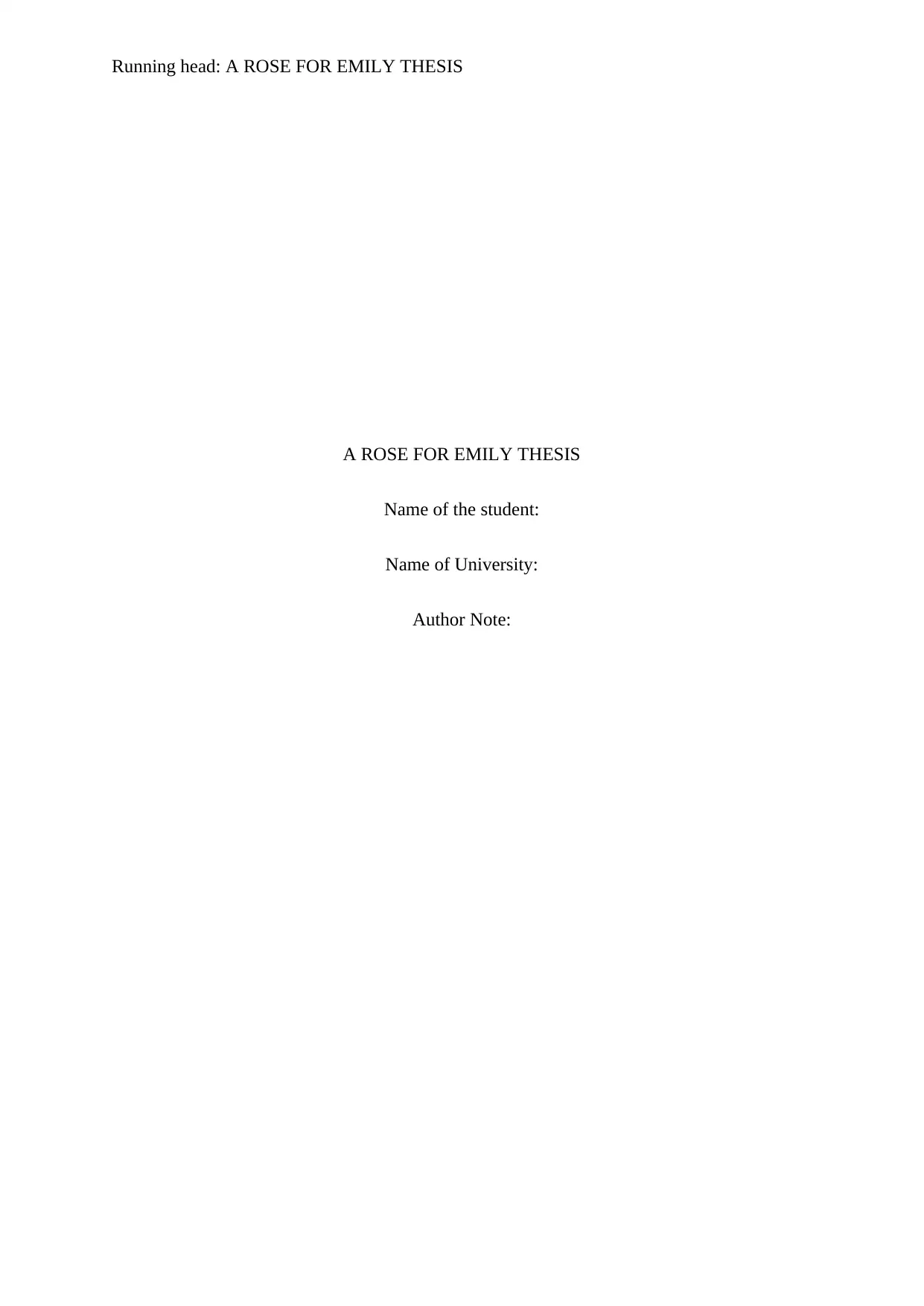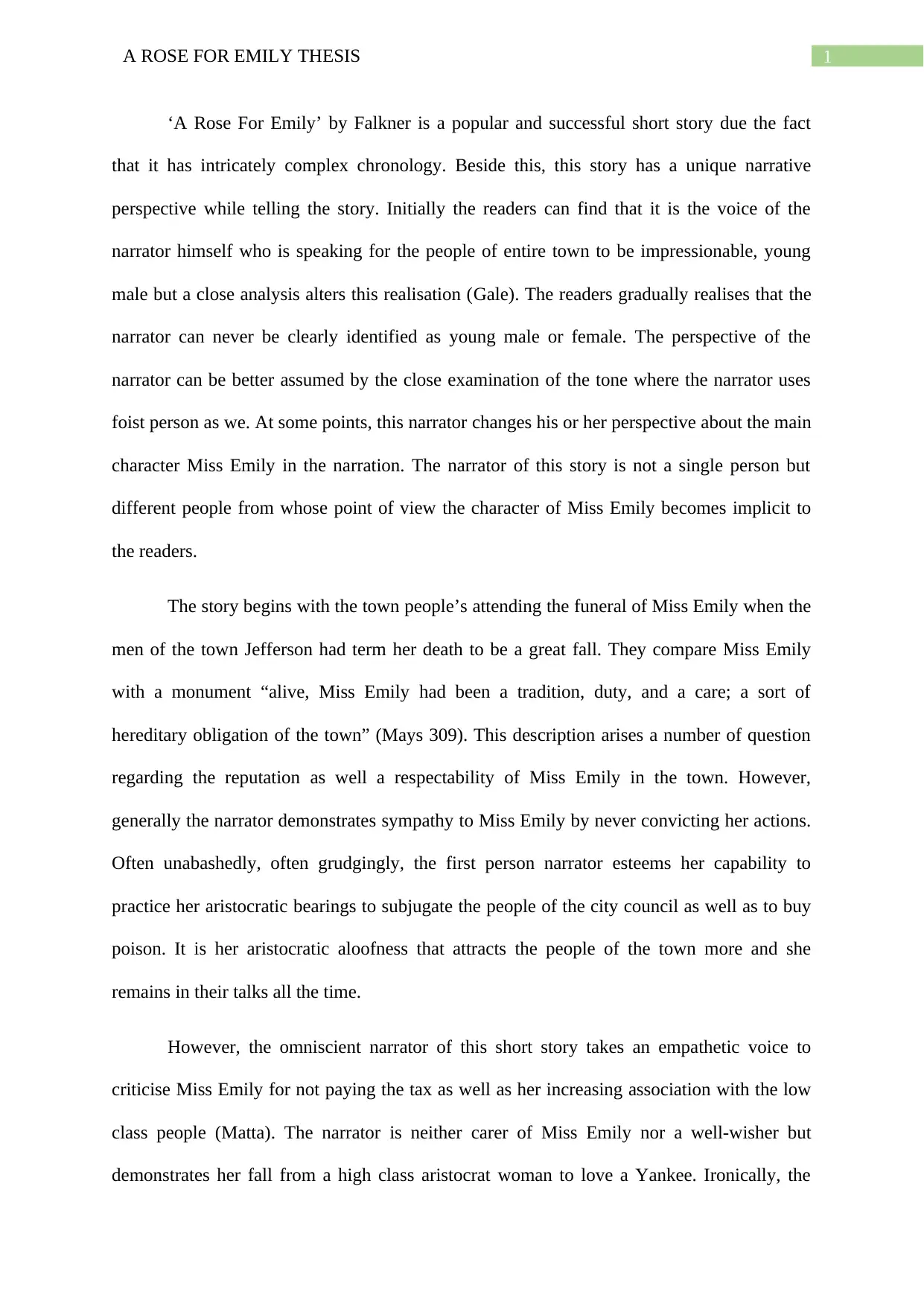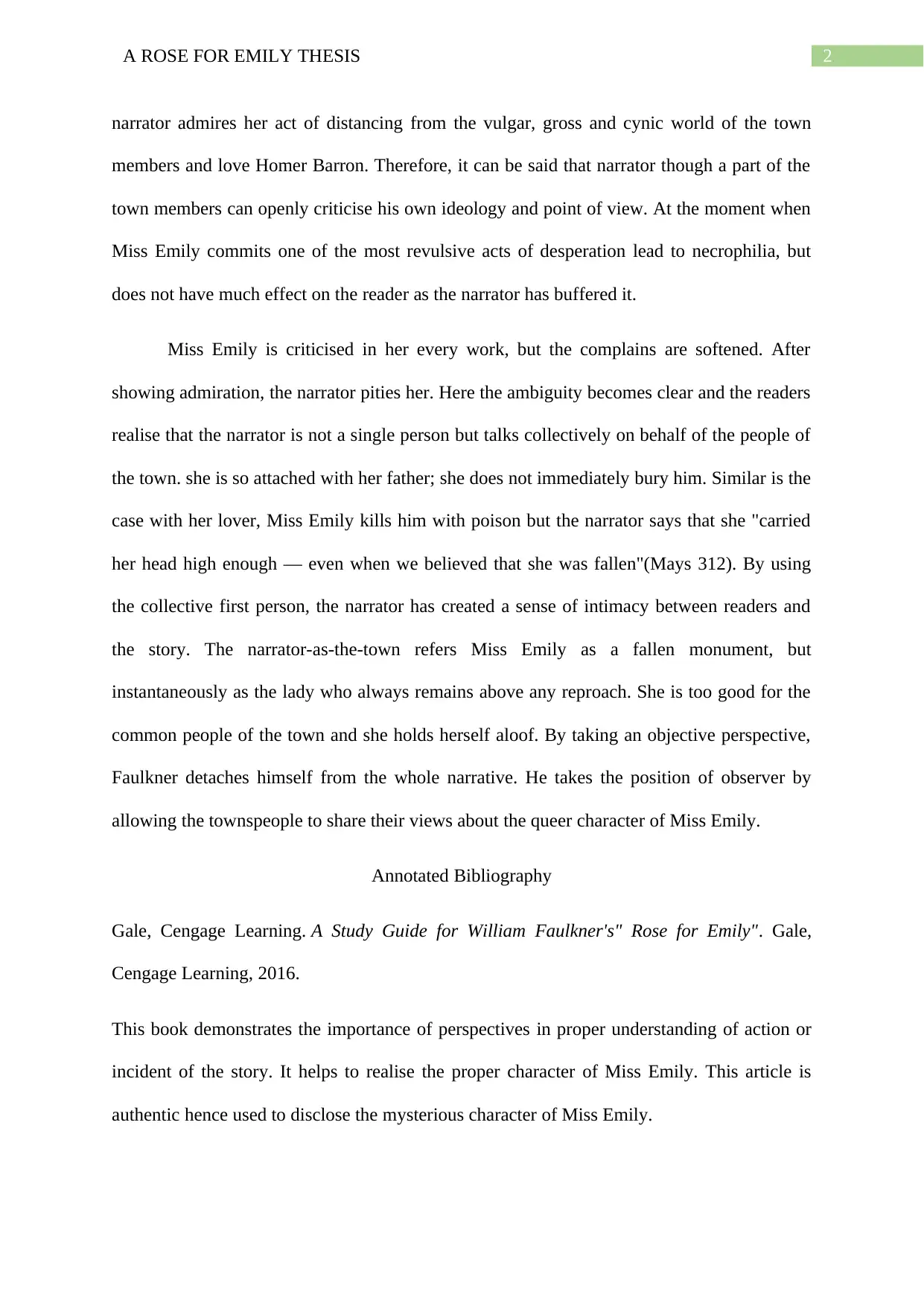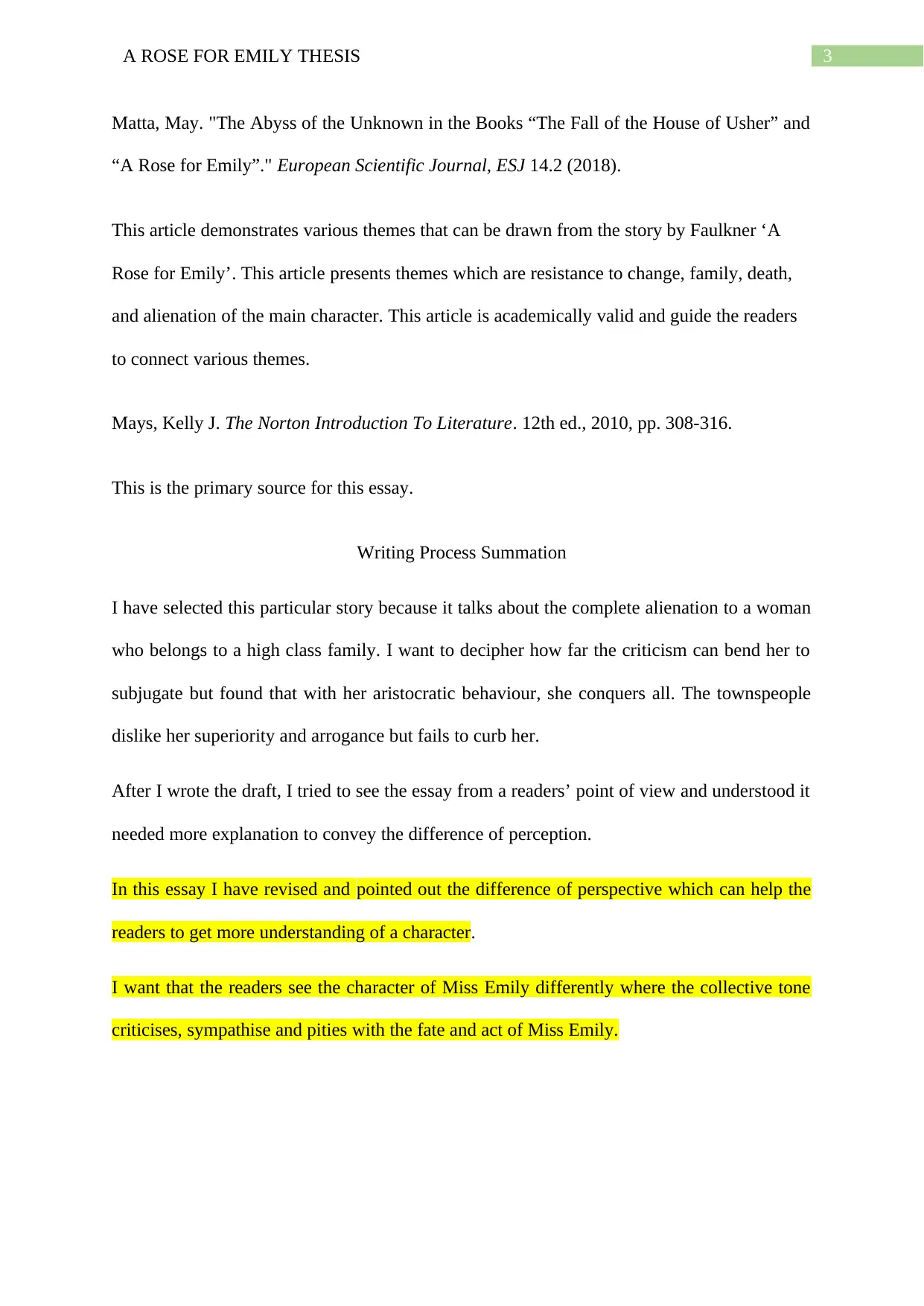A Rose for Emily: Exploring Narrative Perspective and Themes
VerifiedAdded on 2021/04/21
|4
|1077
|24
Essay
AI Summary
This essay provides an in-depth analysis of William Faulkner's short story, 'A Rose for Emily'. The paper focuses on the intricate narrative perspective, examining how the collective voice of the townspeople shapes the reader's understanding of Miss Emily. It explores the shifting tones of the narrator, who oscillates between criticism, sympathy, and pity towards the protagonist. The essay delves into the themes of alienation, class, and the resistance to change, highlighting how Miss Emily's aristocratic bearing allows her to defy societal expectations. The author discusses the story's complex chronology and the impact of the narrator's perspective on the reader's perception of Miss Emily's actions, particularly her controversial choices. The essay also references secondary sources to support its arguments, providing a well-rounded exploration of the story's literary significance.

Running head: A ROSE FOR EMILY THESIS
A ROSE FOR EMILY THESIS
Name of the student:
Name of University:
Author Note:
A ROSE FOR EMILY THESIS
Name of the student:
Name of University:
Author Note:
Paraphrase This Document
Need a fresh take? Get an instant paraphrase of this document with our AI Paraphraser

1A ROSE FOR EMILY THESIS
‘A Rose For Emily’ by Falkner is a popular and successful short story due the fact
that it has intricately complex chronology. Beside this, this story has a unique narrative
perspective while telling the story. Initially the readers can find that it is the voice of the
narrator himself who is speaking for the people of entire town to be impressionable, young
male but a close analysis alters this realisation (Gale). The readers gradually realises that the
narrator can never be clearly identified as young male or female. The perspective of the
narrator can be better assumed by the close examination of the tone where the narrator uses
foist person as we. At some points, this narrator changes his or her perspective about the main
character Miss Emily in the narration. The narrator of this story is not a single person but
different people from whose point of view the character of Miss Emily becomes implicit to
the readers.
The story begins with the town people’s attending the funeral of Miss Emily when the
men of the town Jefferson had term her death to be a great fall. They compare Miss Emily
with a monument “alive, Miss Emily had been a tradition, duty, and a care; a sort of
hereditary obligation of the town” (Mays 309). This description arises a number of question
regarding the reputation as well a respectability of Miss Emily in the town. However,
generally the narrator demonstrates sympathy to Miss Emily by never convicting her actions.
Often unabashedly, often grudgingly, the first person narrator esteems her capability to
practice her aristocratic bearings to subjugate the people of the city council as well as to buy
poison. It is her aristocratic aloofness that attracts the people of the town more and she
remains in their talks all the time.
However, the omniscient narrator of this short story takes an empathetic voice to
criticise Miss Emily for not paying the tax as well as her increasing association with the low
class people (Matta). The narrator is neither carer of Miss Emily nor a well-wisher but
demonstrates her fall from a high class aristocrat woman to love a Yankee. Ironically, the
‘A Rose For Emily’ by Falkner is a popular and successful short story due the fact
that it has intricately complex chronology. Beside this, this story has a unique narrative
perspective while telling the story. Initially the readers can find that it is the voice of the
narrator himself who is speaking for the people of entire town to be impressionable, young
male but a close analysis alters this realisation (Gale). The readers gradually realises that the
narrator can never be clearly identified as young male or female. The perspective of the
narrator can be better assumed by the close examination of the tone where the narrator uses
foist person as we. At some points, this narrator changes his or her perspective about the main
character Miss Emily in the narration. The narrator of this story is not a single person but
different people from whose point of view the character of Miss Emily becomes implicit to
the readers.
The story begins with the town people’s attending the funeral of Miss Emily when the
men of the town Jefferson had term her death to be a great fall. They compare Miss Emily
with a monument “alive, Miss Emily had been a tradition, duty, and a care; a sort of
hereditary obligation of the town” (Mays 309). This description arises a number of question
regarding the reputation as well a respectability of Miss Emily in the town. However,
generally the narrator demonstrates sympathy to Miss Emily by never convicting her actions.
Often unabashedly, often grudgingly, the first person narrator esteems her capability to
practice her aristocratic bearings to subjugate the people of the city council as well as to buy
poison. It is her aristocratic aloofness that attracts the people of the town more and she
remains in their talks all the time.
However, the omniscient narrator of this short story takes an empathetic voice to
criticise Miss Emily for not paying the tax as well as her increasing association with the low
class people (Matta). The narrator is neither carer of Miss Emily nor a well-wisher but
demonstrates her fall from a high class aristocrat woman to love a Yankee. Ironically, the

2A ROSE FOR EMILY THESIS
narrator admires her act of distancing from the vulgar, gross and cynic world of the town
members and love Homer Barron. Therefore, it can be said that narrator though a part of the
town members can openly criticise his own ideology and point of view. At the moment when
Miss Emily commits one of the most revulsive acts of desperation lead to necrophilia, but
does not have much effect on the reader as the narrator has buffered it.
Miss Emily is criticised in her every work, but the complains are softened. After
showing admiration, the narrator pities her. Here the ambiguity becomes clear and the readers
realise that the narrator is not a single person but talks collectively on behalf of the people of
the town. she is so attached with her father; she does not immediately bury him. Similar is the
case with her lover, Miss Emily kills him with poison but the narrator says that she "carried
her head high enough — even when we believed that she was fallen"(Mays 312). By using
the collective first person, the narrator has created a sense of intimacy between readers and
the story. The narrator-as-the-town refers Miss Emily as a fallen monument, but
instantaneously as the lady who always remains above any reproach. She is too good for the
common people of the town and she holds herself aloof. By taking an objective perspective,
Faulkner detaches himself from the whole narrative. He takes the position of observer by
allowing the townspeople to share their views about the queer character of Miss Emily.
Annotated Bibliography
Gale, Cengage Learning. A Study Guide for William Faulkner's" Rose for Emily". Gale,
Cengage Learning, 2016.
This book demonstrates the importance of perspectives in proper understanding of action or
incident of the story. It helps to realise the proper character of Miss Emily. This article is
authentic hence used to disclose the mysterious character of Miss Emily.
narrator admires her act of distancing from the vulgar, gross and cynic world of the town
members and love Homer Barron. Therefore, it can be said that narrator though a part of the
town members can openly criticise his own ideology and point of view. At the moment when
Miss Emily commits one of the most revulsive acts of desperation lead to necrophilia, but
does not have much effect on the reader as the narrator has buffered it.
Miss Emily is criticised in her every work, but the complains are softened. After
showing admiration, the narrator pities her. Here the ambiguity becomes clear and the readers
realise that the narrator is not a single person but talks collectively on behalf of the people of
the town. she is so attached with her father; she does not immediately bury him. Similar is the
case with her lover, Miss Emily kills him with poison but the narrator says that she "carried
her head high enough — even when we believed that she was fallen"(Mays 312). By using
the collective first person, the narrator has created a sense of intimacy between readers and
the story. The narrator-as-the-town refers Miss Emily as a fallen monument, but
instantaneously as the lady who always remains above any reproach. She is too good for the
common people of the town and she holds herself aloof. By taking an objective perspective,
Faulkner detaches himself from the whole narrative. He takes the position of observer by
allowing the townspeople to share their views about the queer character of Miss Emily.
Annotated Bibliography
Gale, Cengage Learning. A Study Guide for William Faulkner's" Rose for Emily". Gale,
Cengage Learning, 2016.
This book demonstrates the importance of perspectives in proper understanding of action or
incident of the story. It helps to realise the proper character of Miss Emily. This article is
authentic hence used to disclose the mysterious character of Miss Emily.
⊘ This is a preview!⊘
Do you want full access?
Subscribe today to unlock all pages.

Trusted by 1+ million students worldwide

3A ROSE FOR EMILY THESIS
Matta, May. "The Abyss of the Unknown in the Books “The Fall of the House of Usher” and
“A Rose for Emily”." European Scientific Journal, ESJ 14.2 (2018).
This article demonstrates various themes that can be drawn from the story by Faulkner ‘A
Rose for Emily’. This article presents themes which are resistance to change, family, death,
and alienation of the main character. This article is academically valid and guide the readers
to connect various themes.
Mays, Kelly J. The Norton Introduction To Literature. 12th ed., 2010, pp. 308-316.
This is the primary source for this essay.
Writing Process Summation
I have selected this particular story because it talks about the complete alienation to a woman
who belongs to a high class family. I want to decipher how far the criticism can bend her to
subjugate but found that with her aristocratic behaviour, she conquers all. The townspeople
dislike her superiority and arrogance but fails to curb her.
After I wrote the draft, I tried to see the essay from a readers’ point of view and understood it
needed more explanation to convey the difference of perception.
In this essay I have revised and pointed out the difference of perspective which can help the
readers to get more understanding of a character.
I want that the readers see the character of Miss Emily differently where the collective tone
criticises, sympathise and pities with the fate and act of Miss Emily.
Matta, May. "The Abyss of the Unknown in the Books “The Fall of the House of Usher” and
“A Rose for Emily”." European Scientific Journal, ESJ 14.2 (2018).
This article demonstrates various themes that can be drawn from the story by Faulkner ‘A
Rose for Emily’. This article presents themes which are resistance to change, family, death,
and alienation of the main character. This article is academically valid and guide the readers
to connect various themes.
Mays, Kelly J. The Norton Introduction To Literature. 12th ed., 2010, pp. 308-316.
This is the primary source for this essay.
Writing Process Summation
I have selected this particular story because it talks about the complete alienation to a woman
who belongs to a high class family. I want to decipher how far the criticism can bend her to
subjugate but found that with her aristocratic behaviour, she conquers all. The townspeople
dislike her superiority and arrogance but fails to curb her.
After I wrote the draft, I tried to see the essay from a readers’ point of view and understood it
needed more explanation to convey the difference of perception.
In this essay I have revised and pointed out the difference of perspective which can help the
readers to get more understanding of a character.
I want that the readers see the character of Miss Emily differently where the collective tone
criticises, sympathise and pities with the fate and act of Miss Emily.
1 out of 4
Your All-in-One AI-Powered Toolkit for Academic Success.
+13062052269
info@desklib.com
Available 24*7 on WhatsApp / Email
![[object Object]](/_next/static/media/star-bottom.7253800d.svg)
Unlock your academic potential
Copyright © 2020–2026 A2Z Services. All Rights Reserved. Developed and managed by ZUCOL.


